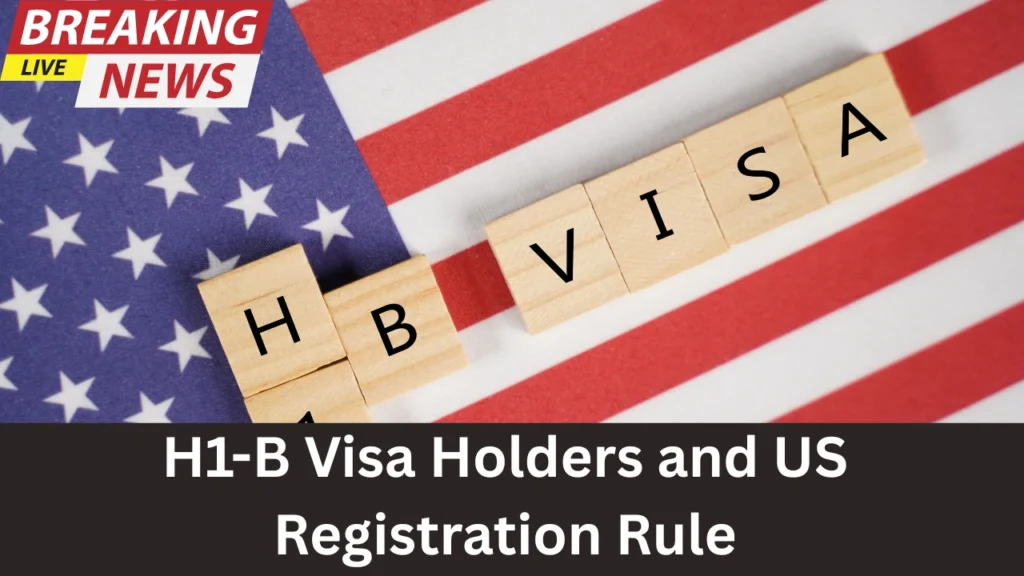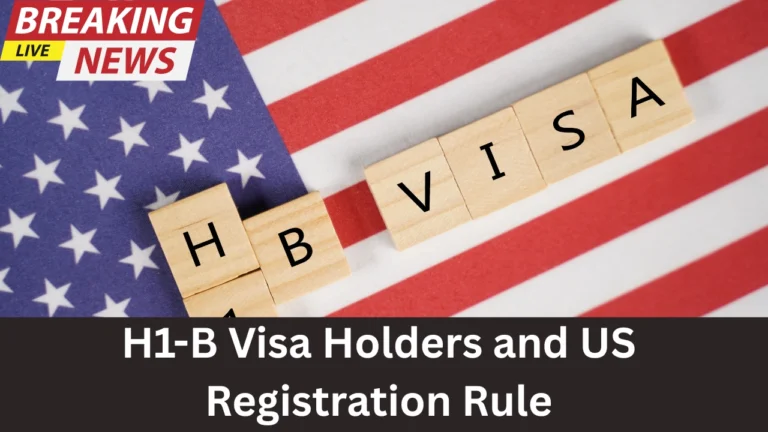The landscape of U.S. immigration policy continues to evolve, and recent judicial and administrative decisions are raising concerns among Indian nationals working and studying in the United States. A new directive supported by the Department of Homeland Security (DHS) and approved by a U.S. District Judge has reinforced a longstanding, but rarely enforced, rule: all noncitizens over the age of 18 must carry immigration documentation with them at all times.

This includes H1-B visa holders, international students, green card holders, and even temporary visitors a majority of whom in several categories are of Indian origin.
📰 Indians are waking up to the reality that the U.S. immigration system is no longer an "open door".
— War for the West (@War4theWest) March 9, 2025
📢 'Anchor babies have been a key strategy for Indians, opening another avenue for gaining permanent residency from a temp visa. @VivekGRamaswamy is an example of this… pic.twitter.com/lk4Z1ELNKj
What Is the New US Immigration Registration Rule?
The rule stems from provisions in the Immigration and Nationality Act (INA), which legally requires all noncitizens in the U.S., regardless of legal status, to register with federal authorities and carry proof of registration.
While this law has existed for decades, it has rarely been enforced stringently—until now.
In a statement issued by DHS, the department emphasized:
“All noncitizens 18 and older must carry this documentation at all times. This administration has directed DHS to prioritize enforcement. There will be no sanctuary for noncompliance.”
The statement follows a recent ruling by U.S. District Judge Trevor McFadden, who gave the Trump administration the green light to proceed with the registration and documentation enforcement policy. Judge McFadden, appointed during Trump’s first term, rejected lawsuits from several immigrant rights groups, saying the plaintiffs failed to prove the regulation would harm their core missions.
Are Indian H1-B Visa Holders Exempt?
No. Indian nationals on H1-B visas are not exempt from the rule. Even though they are legally residing and working in the U.S., they fall under the definition of “noncitizens” and are thus required to comply with the documentation mandate.
In fact, The Times of India reported that this rule explicitly includes already registered foreign nationals, such as:
- H1-B visa holders
- International students (primarily on F-1 visas)
- Legal permanent residents (green card holders)
- People with Employment Authorization Documents (EADs)
- Border crossing card holders
- I-94 visa holders
While these individuals are technically “registered” through their existing immigration status, the obligation to carry documentation still applies.
What Documentation Must Be Carried?
According to DHS guidelines and legal interpretations of the INA, the following documents may be required as proof of legal status and registration:
- H1-B visa holders: Valid visa stamp, I-797 approval notice, I-94 form, and valid passport
- F-1 students: Valid F-1 visa, I-20 form, I-94, and passport
- Green card holders: Permanent Resident Card (Form I-551)
- EAD holders: Valid Employment Authorization Document
These documents must be carried at all times, and failure to produce them upon request could result in penalties, fines, or even removal proceedings, according to immigration attorneys.
Rules for Children and Families
Under the updated enforcement:
- Children of immigrants, including H1-B visa holders and green card holders, must re-register and submit fingerprints within 30 days after turning 14 years old.
- These children, once over 14, may also be subject to the same documentation-carrying rule as their parents.
This policy adds an extra layer of legal responsibility for Indian families living in the U.S., particularly those navigating dependent visa statuses such as H-4 for spouses and children.
Legal Backlash and Human Rights Concerns
Immigrant rights groups have expressed serious concerns about the rule’s implications.
Organizations like the Coalition for Humane Immigrant Rights and United Farm Workers of America attempted to block the rule via legal channels but were denied standing by the court.
“As organizations, many of their harms are too speculative, and they have failed to show that the Rule will erode their core missions,” Judge McFadden wrote in his opinion.
However, Nicholas Espiritu, deputy legal director at the National Immigration Law Center, expressed strong opposition to the ruling:
“This decision is disappointing and will force people into an impossible choice between registering and risking immediate deportation, or refusing and facing penalties.”
Critics argue that the policy could lead to racial profiling, increased fear in immigrant communities, and civil rights violations, especially for communities like Indian nationals who are often mistaken for undocumented immigrants despite having valid legal status.
Practical Implications for Indian H1-B Workers
Indian professionals on H1-B visas make up the largest group of temporary skilled workers in the United States. For them, the rule represents not only a legal burden but also a potential source of daily stress and unintended consequences, such as:
- Difficulty commuting without proper documents
- Workplace risks if documents are lost or damaged
- Exposure to random checks and questioning by immigration officers
- Increased costs for legal advice, travel with original documents, and document renewals
Many fear that this rule may set a precedent for broader surveillance and regulation, especially as the political climate continues to shift in favor of immigration enforcement over reform.
What Should H1-B Holders Do Now?
Given the new directive and legal developments, immigration attorneys recommend the following for Indian nationals on H1-B and other visa statuses:
- Always carry valid immigration documentation—including I-797 approval notices and passports with valid visa stamps.
- Keep photocopies and digital scans of all documents stored securely (but note that digital copies may not be accepted by immigration officers).
- Educate dependents and children over 14 years of age about their obligations.
- Monitor DHS and USCIS notifications for changes to enforcement timelines or exemptions.
- Consult immigration attorneys immediately if approached by enforcement authorities or if documents are lost or stolen.
Conclusion: A New Era of Scrutiny
While Indian H1-B visa holders are lawfully present and registered in the U.S., the recent policy changes underscore that even legal immigrants are not exempt from increased scrutiny. The Trump-era push for more stringent immigration control, now bolstered by a judicial ruling, marks a turning point in how noncitizens are expected to document and defend their status in everyday life.
For Indian nationals the largest community affected by these rules this is a critical moment to stay informed, legally prepared, and cautiously vigilant.

